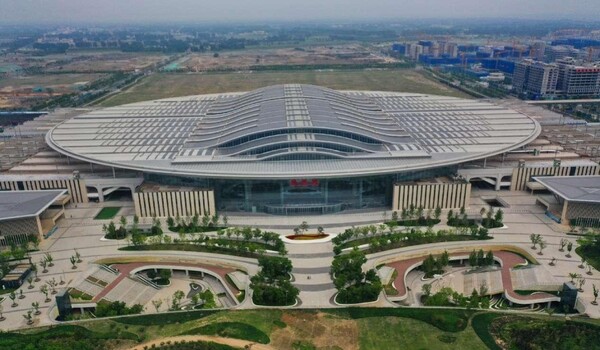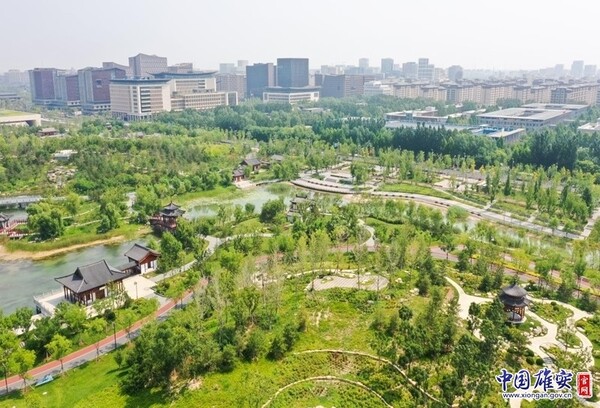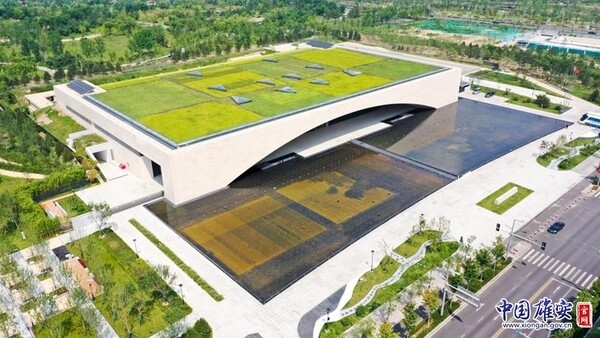By Wan Xiubin, Zhang Zhifeng, Zhang Tengyang, People's Daily
On April 1, 2017, the Chinese government decided to establish Xiong'an New Area in Hebei province, which holds national significance following the footsteps of Shenzhen Special Economic Zone and Shanghai Pudong New Area.
Today, this fertile land of Xiong'an New Area is growing with vibrancy, where innovation and creativity are in a constant state of evolution.
At the construction site of an east-west axis project in Xiong'an New Area's start-up area, tower cranes rose and fell, while construction vehicles zoomed around hauling loads. The sounds of machines hummed as progress on this project was made.
Just a short distance away, the magnificent headquarters building of Sinochem Holdings was built to the 27th floor and was soon to be completed. Once finished, the building will attract various resources to Xiong'an New Area.

According to Liu Chen, project manager of the headquarters building project from the Third Construction Co., Ltd. of China Construction Second Engineering Bureau, the construction of the headquarters building kept on during the just-concluded Spring Festival holiday, and the building has been "growing" one floor higher every seven days.
The project adopts an intelligent construction and management philosophy and applies multiple innovative technologies to ensure high-quality construction, he added.
Hebei province and Xiong'an New Area have always upheld high standards and quality throughout all stages, comprehensively promoting the development of key areas and the construction of major projects.
Since its establishment, Xiong'an New Area has implemented a total of 292 key projects. More than 4,000 buildings have risen on this land. Additionally, 712 kilometers of new roads, 141 kilometers of new underground pipelines, and 315 kilometers of new water conservancy dams have been constructed.
As winter turns to spring, the ice on the Baiyangdian Lake melts away. Deep in the reed marshes, water birds dart about, creating ripples on the water.
Hebei province has taken a holistic approach to managing the entire Baiyangdian Lake, advancing integrated efforts in water replenishment, pollution control, and flood prevention to systematically improve the lake's ecological environment.

The water quality in the lake area has been remained at Grade III in the country's five-tier water quality system, up from Grade V classified as the worst quality in 2017.
"In recent years, more and more wild birds have come to the Baiyangdian Lake, including the critically endangered baer's pochard, which used to be a migratory species but has now become a year-round resident," said Qi Ming, a volunteer in Anxin county who often observes and photographs birds near the Baiyangdian Lake.
Biodiversity in the Baiyangdian Lake has further increased. There are 276 recorded species of wild birds, an increase of 70 compared to the time before the establishment of Xiong'an New Area. The number of wild fish species has reached 48, up 21.
With an aim to nurture a green city, Xiong'an New Area has cumulatively planted more than 30,000 hectares of forests. A number of high-quality recreational facilities like suburban parks and the Yuerong Park, which is the first large-scale comprehensive park in Xiong'an New Area, have opened, increasing the forest coverage rate from 11 percent to 34.7 percent.
In a corner of the Yuerong Park, the curved facade of a building forms the shape of an eye together with the reflections on the water. This is the Xiong'an Urban Computing Center, the hub for building a digital city and creating a "Xiong'an on the cloud."
Inside the control room of the center, a staff member typed commands on keyboards and a "smart ecology tree" appeared on a giant ring-shaped screen. This "tree" was a combination of various digital platforms of Xiong'an New Area, showcasing real-time updated data and charts of different intelligent applications.
"For example, if the system detects that an elderly resident who lives alone has had no recent water usage, it will automatically trigger an alert for community workers to visit and check on the resident," said Yao Kaixuan from the China Xiongan Group Digital City Technology Co., Ltd..
Such intelligent scenario epitomizes Xiong'an New Area's push for smart governance.

With the Xiong'an Urban Computing Center as its core, Xiong'an New Area has built a block data platform, city information modeling platform, Internet of Things platform, and video surveillance platform. They converge over 28 billion pieces of urban operation data, building a digital twin of the physical city in the virtual world. This enables more refined, intelligent city governance.
Xiong'an New Area is primarily the receiver of non-capital functions from Beijing.
In the Rongdong area of Xiong'an, there is a large complex that gathers six major types of buildings - offices, convention centers, luxury apartments, and more. This is Xiong'an Business Service Center, the first urban functional area in Xiong'an New Area to undertake the relocation of non capital functions from Beijing.
It can provide customized office spaces for relocated entities and offer government approval, tax and social security services, fulfilling the end-to-end needs of relocated entities settling in.
Today, construction is picking up pace on the new headquarters for Sinochem Holdings and China Huaneng Group in Xiong'an New Area. In November 2023, ground was officially broken on the Xiong'an campuses of four Beijing universities - Beijing Jiaotong University, University of Science and Technology Beijing, Beijing Forestry University, and China University of Geosciences Beijing.
So far, the first batch of headquarters of centrally administered state-owned enterprises, universities, hospitals to be relocated from Beijing to Xiong'an, and a number of market-oriented decentralized projects have started construction. Over 200 institutions of various types have been established by centrally administered state-owned enterprises in the new area.
As spring arrives, there is a palpable sense of energy and renewal in Xiong'an New Area. Like the rising tides of the Baiyangdian Lake, the new area will continue to grow at an impressive pace, steadily bringing to life the vision of a futuristic city.


